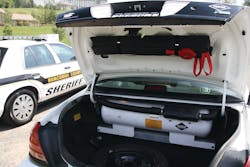Sheriff's office saves thousands with propane autogas fleet
The Buncombe County, NC, Sheriff's Office recently converted 10 Ford Crown Victorias to propane autogas under the Southeast Propane Autogas Development Program. The vehicles are expected to displace 20 tons of greenhouse gas emissions each year and save more than $13,000 annually on fuel cost savings running on autogas.
"We were looking at two main things when it came to switching to alternative fuel vehicles," said Buncombe County Sheriff Van Duncan. "We wanted to boost our bottom line in terms of fuel cost savings and also have cleaner-burning cars on the road."
Propane autogas was the practical fuel choice, he added, because it supports these goals and utilizes an American-made fuel. Plus, there isn't a noticeable difference in vehicle performance other than the "motor runs a little quieter" on autogas.
The 10 Ford Crown Victorias patrol cars travel an average of almost 25,000 miles each year. They use around 17,000 gallons of propane autogas annually.
Fleets like Buncombe County Sheriff's Office will save even more on fuel costs this year with the recent extension of the 50-cents-per-gallon federal tax credit for alternative fuel.
The vehicles were outfitted with the bi-fuel Prins VSI (Vapor Sequential Injection) autogas system which allows drivers to switch to gasoline in case the autogas tank runs low out of range of a fuel station range.
"The ability to switch back to gasoline is a tremendous option for law enforcement fleets," said Sheriff Duncan. "It's just one button on the center of the dash and you're back to running on gasoline."
WIDELY USED
Propane autogas is the most widely used alternative fuel in the world, powering more than 18 million vehicles, according officials at Alliance AutoGas, which provides propane vehicle conversion and alternative fuel options (www.allianceautogas.com).
Since autogas burns 20 percent cleaner than gasoline, many autogas fleets report reduced maintenance needs, such as fewer oil changes, and increased engine life, which translates to less vehicle downtime and increased savings in the long run, they say.
About the Author

